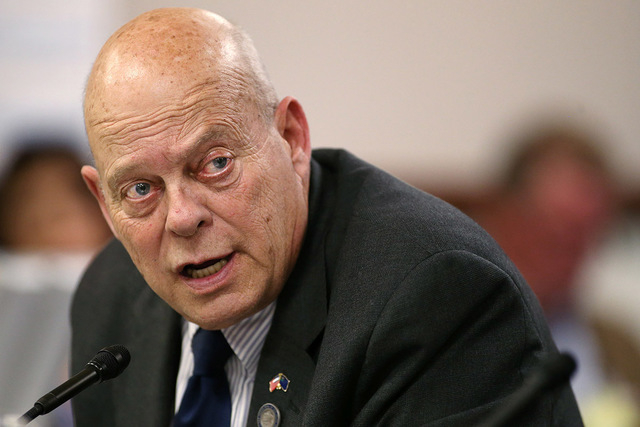Collective-bargaining bill derided as playing ‘hide and seek’ with money

CARSON CITY — A collective bargaining bill in the Legislature has one lobbyist concerned that it would lead to local governments playing “hide and seek” with money. But supporters say the legislation is needed to give government agencies more long-term financial stability.
The Assembly Ways and Means Committee held a hearing Monday on Assembly Bill 249, which limits what a fact finder can consider when a union and the government agency go to fact-finding and arbitration. A fact finder, or arbitrator, issues a final, binding decision on a collective bargaining agreement when both sides fail to agree.
The bill also requires that the agency’s chief executive officer to report before the vote on whether the agreement is financially sustainable.
Under the bill, an arbitrator cannot consider a local agency’s budgeted ending fund balance — that is, up to 25 percent of its budgeted expenditures from the general fund not including capital projects. The bill would require proposed collective bargaining agreement to be publicly posted at least 21 days before the governing body acts on them.
“This is also a transparency bill, not just a financial stability bill,” said Assemblyman Jim Wheeler, R-Gardnerville, the bill’s sponsor.
Mary Walker, a lobbyist for Carson City and Lyon County, said that a fact-finder now looks only at a local government’s ability to pay, including a one-time influx of money from a real estate sale. She said it’s not sound financial management to fund continuing costs with one-time sources of money.
Union officials have concerns.
Rusty McCallister, a lobbyist for the Professional Fire Fighters of Nevada, said the bill lacks a fiscal note, which outlines what the costs for the state would be.
He said his organization believes that information is needed because the state’s Employee-Management Relations Board would see more grievances filed if the bill became law, and that would require more manpower.
McCallister also said the bill would let local governments game the system by shifting money around to different line items on the budget and then putting the funding elsewhere after the contract is reached. He described that as playing “hide and seek” with the money.
The committee didn’t take action Monday on the bill. Assembly Majority Leader Paul Anderson, R-Las Vegas, the committee’s chairman, said the committee will compare the bill to other legislation that’s already passed, and see whether its goals are covered elsewhere.
Senate Bill 241, which has passed the Assembly and Senate, would prevent a government agency from increasing compensation or benefits until a new contract is approved. Gov. Brian Sandoval hasn’t yet said whether he’ll sign it.
The bill also allows government agencies to give employees leave for union work, but requires that the labor organizations pay the costs. Currently, government agencies can pay employees when they’re on union leave. It takes school administrators out of collective bargaining if they make more than $120,000 a year and also makes principals “at will” employees for the first three years.
The Assembly on Friday passed Senate Bill 168, which would allow government agencies to declare a “fiscal emergency” and reopen union contracts for negotiations.
The bill initially failed in the Assembly on Thursday. Assembly Minority Leader Marilyn Kirkpatrick, D-North Las Vegas, added an amendment that changed how much of an ending fund balance is exempt from contract negotiations. It’s 16.6 percent of the agency’s overall budget, down from 25 percent.
Contact Ben Botkin at bbotkin@reviewjournal.com. Find him on Twitter: @BenBotkin1.

RELATED STORIES
Gov. Sandoval signs bill allowing slot machines with skill factor
Bill calling for annual Nevada legislative session clears key Senate panel
Nevada Assembly kills ‘campus carry’ gun amendment
Assembly approves bill exempting high-earning school administrators from collective bargaining
Nevada Gov. Brian Sandoval’s compromise tax plan gets guarded legislative reception
See all of our coverage: 2015 Nevada Legislature.












